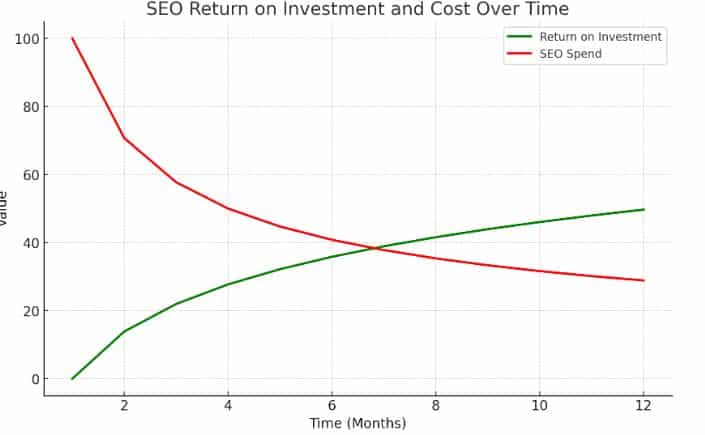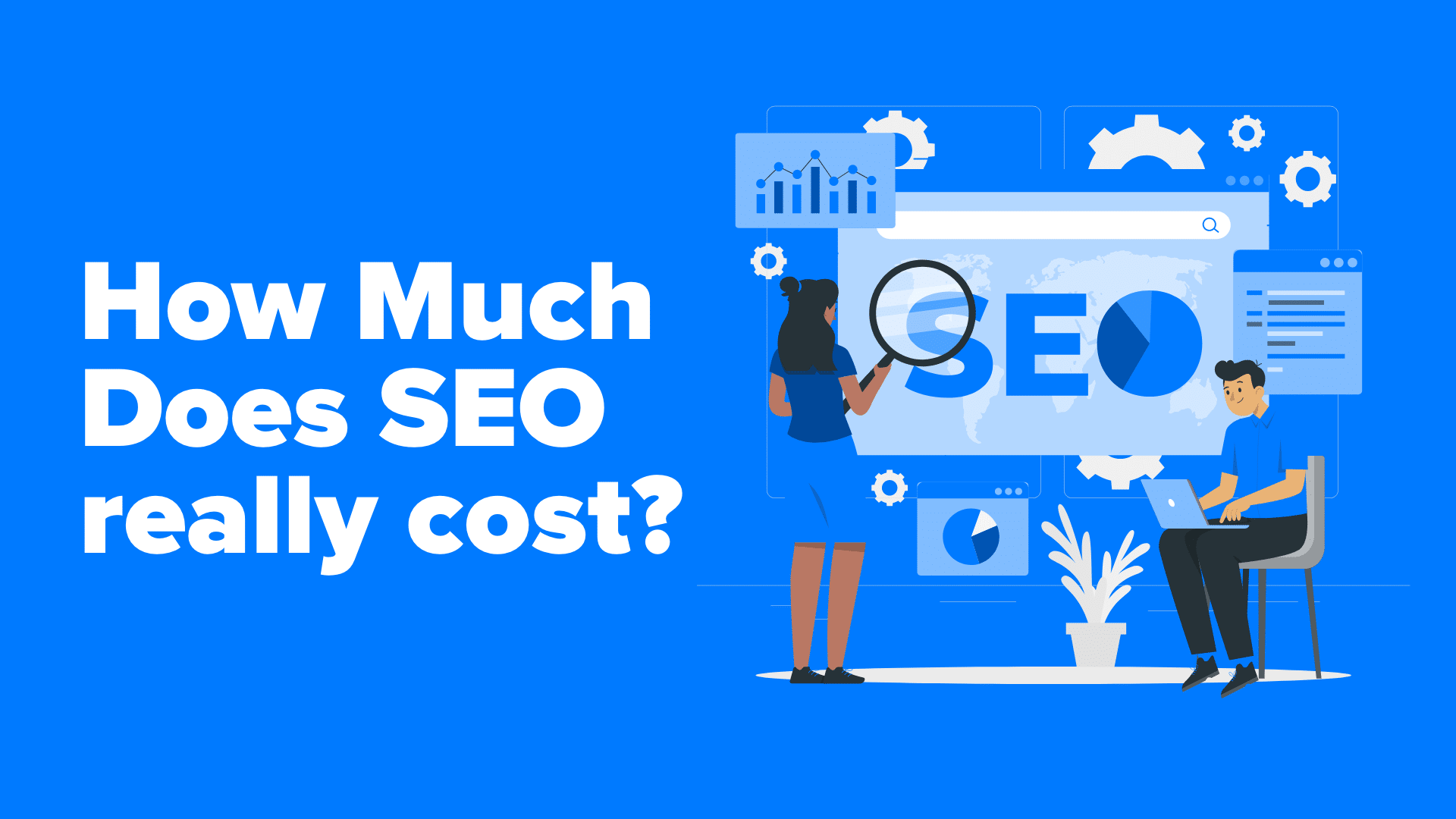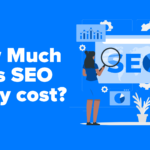Many articles detail the top-level costs of SEO.
While the fee you will pay an SEO consultant or agency is part of the cost to do SEO, getting results also requires a contribution in time and effort from the business.
This article will look beyond the surface at the full spectrum of costs associated with doing SEO well, enabling you to approach 2025 well-prepared for SEO success.
SEO costs: The basics
If you are just looking for a straightforward overview of SEO costs, several studies have answered the question.
Exact costs vary depending on factors such as business size, goals, industry, geographical location, and the overall complexity of the project, but as an average in 2025, we have:
- Hourly rates between $75 and $100.
- Project-based fees from $2,501 to $5,000.
- Monthly retainers ranging from $500 to $1,500.
- Local SEO ranges from $250 upwards, depending on competition and total locations.
While some of these figures may seem high, most businesses are small, and their SEO costs are much lower.
In the U.S., small businesses typically spend $500 or less per month on SEO, while in the UK, the average monthly spend is around £500.
The problem with generic SEO costs
Unfortunately, there is a problem with this pricing model as it relates to SEO.
Improving your SEO is a more involved and complicated process than buying traffic.
Generic, top-level figures assume that SEO is an entirely hands-off process.
You pay a consultant or agency $$$ per month, and they wave their magic SEO wand and shout “Optimizara” and – Bibbidi-Bobbidi-Boo! – you appear magically at the top of the search rankings.
Unsurprisingly, that is not how things work in the real world, and effective SEO requires a synergy between the business and the SEO consultant.
In 2025, SEO is hyper-competitive. Competition comes from search ads, AI Overviews, brands, and more aggressive and advanced competitors.
SEO for 2025 should focus on improving visibility across these SERP features.
Succeeding in this landscape requires sage SEO guidance, a strong SEO strategy, a clear SEO plan, and lots of hard work! You have to aim at what Google is aiming at.
Fortunately, Google’s philosophy for SEO is articulated by E-E-A-T.
The content Google wants to surface is based on experience and expertise from trusted authority figures in your industry.
Your SEO is unlikely to be that authority in your business, so rather than someone who does it all for you, your SEO should be a guide who analyzes the current SEO situation and provides you with a map to better results.
Your SEO should be a kind of SEO Obi-Wan Kenobi – a wise sage who will tutor you in the ways of the SEO force and guide you forward.
Instead of viewing SEO as a one-time service you pay for and complete, it’s better to think of it within the framework of the 3Ms model: manpower, money, and minutes.
- Manpower is the time you provide.
- Money is how you pay for guidance and advice.
- Minutes is how long it will take to get results (a key SEO consideration).
This will allow you to develop a more holistic and comprehensive idea of how much SEO will cost to develop results.
Is SEO the right choice for now?
On that note, you must consider whether SEO is the right fit for your immediate needs.
SEO is powerful, but it often takes time, so if you need new business today, you may need to have an SEO or PPC conversation first.
The key here is to consider your goals, often using a system like SEO SMART goals.
Then, determine if SEO’s realities align with your overall marketing requirements.
If you decide to integrate SEO into your broader marketing approach, be mindful of tracking your progress with KPIs.
Dig deeper: When your business doesn’t need SEO
The SEO outsourcing trap
One final word of warning.
SEO is not the same as PPC.
Google wants to show the best sites at the top of the search engine.
You can’t just pay to play with SEO.
This thinking can cause you to fall into an SEO outsourcing trap.
This is where you constantly seek the agency that knows the secret to SEO and will be able to succeed where many others have failed before them.
Remember, no agency has a special relationship with Google, and there is no secret trick to get to the top of Google (for long, at least).
Strategize. Plan. Do the work.
The real costs of SEO
Let’s dig a little deeper and look at how to understand the true costs of doing SEO well.
SEO is not as simple as Google Ads.
It is not a direct pay-to-win model or as straightforward as paying an agency and getting guaranteed results.
Investing in organic search requires:
- Analysis.
- Insight.
- Strategy.
- Expert guidance.
- Tactical support.
- Technical updates.
- Creative effort.
It works best when the SEO and the business work closely together, where the SEO often plays the role of researcher, strategist, and project manager to pull everything together.
If I haven’t scared you off yet – and if you really want to improve your SEO, which you really should – then you must go into this with your eyes open and expect it to be difficult.
You will need to sacrifice time and money on the altar of SEO success, but if your sacrifice is worthy, there will be a pile of gold at the end.
Remember, the smartest SEO happens at the intersection of your business knowledge and the agency’s SEO expertise.
Working together, you can achieve results far beyond what either could accomplish alone.
At its heart, this is multi-format content marketing and SEO integrated and working together.
Caveats aside, let’s break this down into a more comprehensive set of SEO costs:
1. SEO outsourcing costs
Your first SEO cost is for professional advice from a credible, experienced expert.
As detailed above, this will cost you anywhere from $100 per hour upwards, depending on competition, complexity, and scope.
Be mindful that there are many types of SEO companies, all of which offer a range of services from analysis and strategy to technical SEO and content creation.
As such, educate yourself on your situation and likely requirements.
Be prepared to do an initial piece of work to:
- Understand your marketplace.
- Assess your current SEO situation.
- Develop a plan with clear timelines.
Before you dive in, it’s crucial to become an educated buyer and understand the difference between SEO goals, strategy, and planning.
With a solid plan in place, you can then determine who will handle what responsibilities on both the client and agency sides.
The plan is crucial – don’t skip this step.
Although it may seem like extra work, planning saves time and money while improving results.
Choose wisely and plan effectively. This step determines whether you succeed or face slow, gradual, painful failure.
2. SEO internal resources costs
As a business, there are many ways you can inform and assist the agency in developing your SEO, including:
- The marketing big picture: The agency needs to understand the overall marketing strategy and approach and where SEO fits into that bigger picture.
- Defining goals and objectives: Goals and objectives must be clear for the overall marketing and SEO within that larger framework.
- Content creation and approval: The agency may help, but often, this will depend upon specific industry knowledge that the business may need to provide. In many cases, the content may need to come from authentic individuals within the company to hit those E-E-A-T targets.
- Website support: Not all agencies provide website support, and many websites are complicated and require developer support to optimize the website design and SEO fully. Your website remains crucial and must be carefully planned to maximize SEO success.
- Reporting and feedback: SEO is often judged on several KPIs, but it can be helpful to close the loop here and reconcile conversions to actual leads and sales. This will help the agency understand the real-world impact rather than just the metrics and improve results.
- Training: Where the business will perform some of the more day-to-day SEO tasks, time may be assigned for training sessions.
- Day-to-day SEO tasks: Where the business is undertaking website updates or content creation, there are some SEO tasks here (all of which should be covered in the SEO training).
- Regular communication and meetings: SEO is an iterative process, and healthy engagement on the client side only helps ensure that opportunities are grasped and the SEO stays oriented toward the goal. Regular catch-ups, reviews, and communication help ensure hurdles are overcome and progress is consistent. This all takes time, but will improve results and keep you on track.
The specifics here will always vary depending on the business and that all-important SEO plan.
The key takeaway is that the best results will come when the business and agency work together toward agreed goals.
Dig deeper: Where should you spend your SEO budget?
3. The cost of not doing SEO
Not doing SEO also carries costs and impacts on the business.
- Reduced visibility: If your customers search, not being organically visible will lead to less visibility and fewer visitors.
- Reduced local or brand awareness: If customers can’t find you, this impacts direct business, referrals and recommendations.
- Credibility: There is a trust associated with organic rankings, and if you rely solely on ads or other means, then this will impact credibility and conversions.
- Impact on other channels: Should a prospect find you from other marketing, they may still search for you unless you consider how your business is presented in search results. Then, you could lose business for all the wrong reasons.
- Losing out to competitors: Each job you don’t win is what your competitors do. By not having a solid organic presence, you are slowly losing ground that will be harder to reclaim.
- Higher advertising costs: Organic, when well-established, tend to have higher engagement and lower costs for generating leads and sales than other channels. This pushes you to rely on more expensive channels and again seeds a competitive advantage to your competitors who are winning more work at lower costs.
Ultimately, if your customers use search engines and you don’t do SEO, you are almost certainly losing out and handing opportunities to your competitors.
4. The cost of doing SEO badly
There is the old saying that if you think it is expensive to use an expert, wait until you see how expensive it is to do the job cheaply with an amateur.
That is SEO in a nutshell.
There are SEO experts on Fiverr.
There is always someone who will do the job for less.
Many low-rent SEO tools and companies will make wondrous promises but deliver very little.
The SEO AI tools are the latest addition of big promises and offer to pump out content daily to boost your SEO, but they will do little to help and could cost you dearly.
Doing SEO badly will, at best, cost you time and money.
Worse still, in the helpful content world, doing SEO badly could hurt your site’s ability to rank in the future.
The key is to use a credible, experienced expert and to put a plan together.
Don’t scrimp on SEO today; it is too expensive in the long run!
5. Costs for SEO software and tools
Another SEO cost is the many tools available that aim to help you rank.
These tools range from around $50 to $100 monthly for a single site.
These tools certainly have their uses from a monitoring perspective, and they can also provide suggestions regarding tasks that may improve your SEO.
The main problem with these tools is that they have to make recommendations, many of which will do nothing to improve your SEO whilst eating up a lot of your time.
John Mueller addressed the output of SEO tools in a recent Reddit SEO thread.
- “Any SEO tool will spit out 10s or 100s of ‘recommendations,’ most of those are going to be irrelevant to your site’s visibility in search. Finding the items that make sense to work on takes to experience.”
That is our experience, and whilst SEO tools can be helpful, they require an experienced eye to separate the wheat from the chaff.
My take on whether you should use SEO tools is that it depends on your experience.
If you are a novice SEO trying to use the tool to steer your efforts, you will likely eat up many hours, days and weeks following the advice of a tool that will do nothing to help your SEO.
The real cost of SEO tools for most novice users is simply the lost time (which is the most precious resource of all).
6. Time to results
An important note with SEO vs. other paid tactics is that it can take a while to benefit from improved visibility and traffic.
Over time, you can often reduce SEO spend while seeing results stabilize and keep improving, but be prepared for the long game and don’t give up before you capture the hill!


In the early stages, SEO often involves marketing spend aimed at progress toward a goal, but with little immediate tangible business result, so keep this in mind.
Dig deeper: What percentage of your budget should go toward SEO?
Get the newsletter search marketers rely on.
SEO planning and accurate SEO costs
The key to getting accurate SEO costs is to work on an SEO plan.
The specifics here will vary, but at a high level, you will need to determine your:
- Situation: Where are you now?
- Objectives: Where do you want to get to?
- Strategy: What is the overarching strategy? Why should Google rank you?
- Tactics: What are the specifics of your approach?
- Action plan: Who will do what and when?
- Measurements: How will you measure progress and results?
Once you understand all of the financial costs and internal resources and how long it will take to start seeing actual traffic, you can decide how to proceed.
There is a wonderful little book called “The Art of War” by the military strategist Sun Tzu, written around 500 BCE.
Much can be mined from this book for business and marketing strategy, and the following statement seems particularly apt for SEO:
“Strategy without tactics is the slowest route to victory. Tactics without strategy is the noise before defeat.”
A lot of SEO is tactics without strategy, citations, links, blog posts, etc. This never goes anywhere.
Strategy is only useful if it is acted on through tactics.
You need a well-researched and documented plan to understand the costs and timescales.
Remember, professionals have plans; with modern SEO, this is the difference between success and failure.
How much should you spend on SEO?
This is a trickier question and depends on your business and situation.
Small businesses should generally spend between 7% and 12% of their gross revenue on marketing.
How much of that should be spent on SEO depends on:
- Your current rankings.
- How vital SEO is as a channel for customer acquisition.
- And myriad other factors.
If you believe that 50% of customers will search and find you, investing 50% of your marketing budget on organic search and SEO may make sense.
Or you could spend 25% on paid search and 25% on organic (depending on your short vs. long-term goals).
It is impossible to answer this question without considering your current situation, so I recommend enlisting the help of an expert to help you develop a plan and move forward.
The real cost of SEO
My aim here is to give you a broader overview of everything required to do SEO well in 2025 and beyond.
If you approach this thinking that you can get everything you need by spending just $500 a month, you will never compete with businesses that also invest their time and effort into building a long-term plan and vision for SEO.
Even for smaller businesses and local firms, where the agency can handle most of the work, you will achieve far better results by collaborating closely on content.
The win happens at the intersection of the business’s customer knowledge and the SEO’s knowledge of search.
If you’ve read this far, take solace in the fact that most won’t – and likewise, most won’t put in the requisite effort to get real results.
Most companies will either do the job badly or not at all. By being one of the few willing to put in the work to do it properly, you are already well ahead of the pack.
Find an expert to guide you, work diligently to build a plan, and aim squarely at being the best — and letting the world know about it.
This approach will embed SEO into your business in a way competitors can neither easily copy nor compete with.
Good luck!
Dig deeper: How to create and manage an SEO budget
Contributing authors are invited to create content for Search Engine Land and are chosen for their expertise and contribution to the search community. Our contributors work under the oversight of the editorial staff and contributions are checked for quality and relevance to our readers. The opinions they express are their own.







